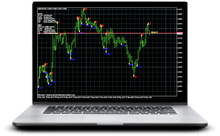Position trading
Information is not investment advice
Position trading is the longest-term trading style that requires a good understating of fundamentals, an exceptional gut feeling as well as a good foresight into how price will fluctuate in the long-term. It’s a trading style for traders with steel nerves and angelic patience, those who don’t mind waiting for long periods of time for their well-deserved rewards.
The primary goal of position traders is to benefit from the dominant trends rather than from short-term market fluctuations.
Normally, position traders are not only extremely smart but also very wealthy. To withstand substantial troughs and swings of prices, any position trader needs to have a sizeable account.
Position traders are the independent thinkers. They carry conviction in their view and tend to ignore random market fluctuations that might frighten away less confident players.
Example of a trader

Warren Buffet is the first who comes to mind when we think about the most prosperous market participants executing long-term trades. He is a legend and one of the wealthiest men in the world. He is widely known as the most successful investor and has been a position trader in FX market since 2002. That time Buffet sold the US dollar arguing that it was to fall because of America’s trade deficit. The next few years were successful for him, but in 2005 the US currency went up and Buffet decided to exit his short USD position. As a result, he earned $2 billion on the trade. Had it not been for the USD advance in 2005, his profit would have been $1 billion higher.
Other articles in this section
- Fibonacci fan
- Fibonacci expansion
- How to Use Fibonacci Retracements
- Reversal candlestick patterns
- Continuation candlestick patterns
- How to deal with market noise?
- Gator Oscillator
- Awesome Oscillator
- Ranges
- Alligator indicator
- Bill Williams theory
- Fractals
- Chart patterns
- Uncovering Gann indicators
- Candlestick patterns
- Carry trade
- Scalping
- Fibonacci tools
- Trader's psychology
- How to identify market reversal
- Japanese Candlesticks
- Trends
- Market conditions and phases











